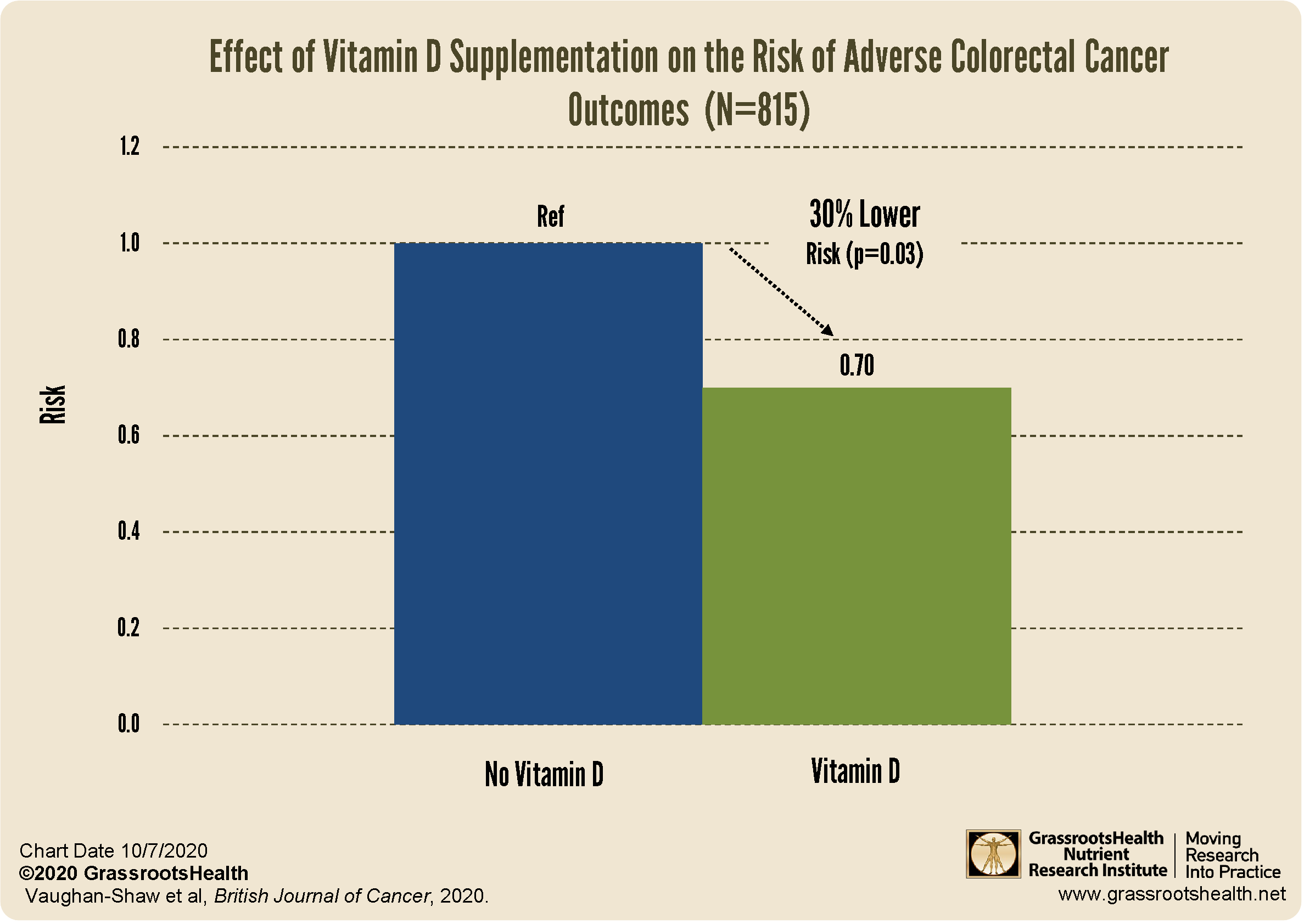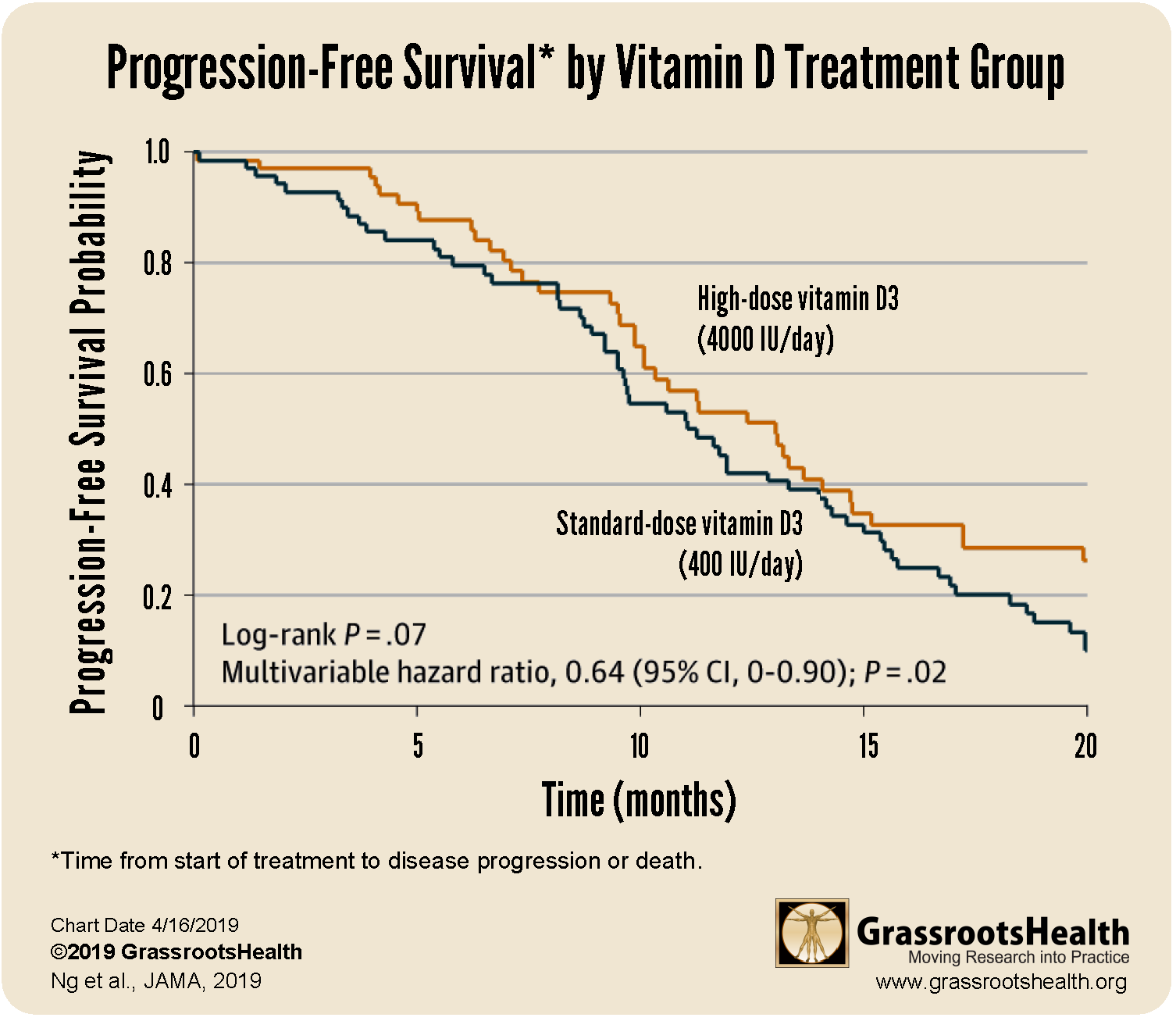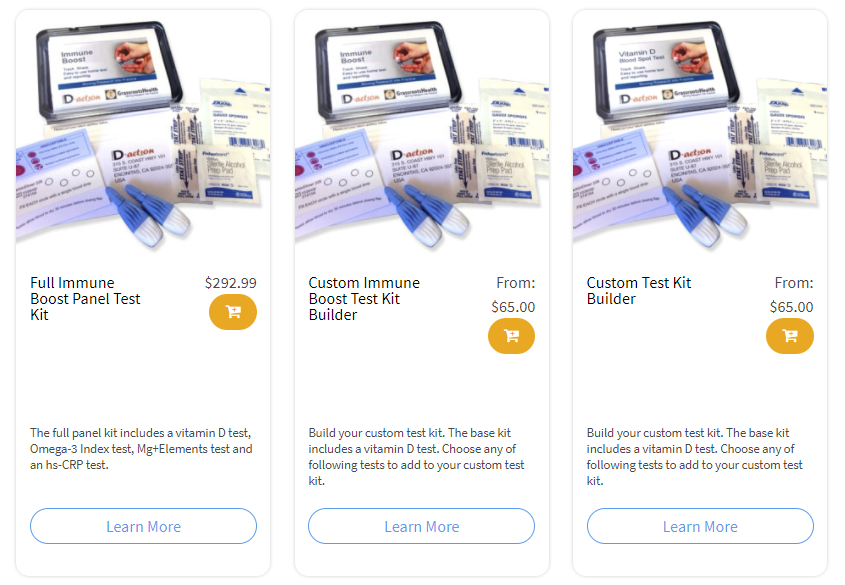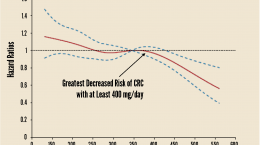Published on October 12, 2020
Meta-analysis shows beneficial effects of vitamin D supplementation for patients with colorectal cancer
As the third most common cancer world-wide, colorectal cancer affects millions of lives each year, with approximately 860,000 deaths annually. Several studies have found a correlation between vitamin D levels and/or intake and the survival rates of colorectal cancer (CRC), as well as sun exposure and CRC risk.
Meta-analysis Shows Vitamin D Supplementation Improves Colorectal Cancer Outcomes
 A meta-analysis is a statistical analysis that combines the results of multiple studies that have investigated the same question. The meta-analysis can be a powerful tool when studies have had conflicting results and when examining diseases that have low rates. For example, in one of the studies included (VITAL), the study lasted 5 years and included 25,871 people, but had 98 CRC cases of which 25 died.
A meta-analysis is a statistical analysis that combines the results of multiple studies that have investigated the same question. The meta-analysis can be a powerful tool when studies have had conflicting results and when examining diseases that have low rates. For example, in one of the studies included (VITAL), the study lasted 5 years and included 25,871 people, but had 98 CRC cases of which 25 died.
Vaughan-Shaw et al. looked at data from 7 randomized controlled trials (RCTs), 3 RCTs that included CRC patients at enrollment, and 4 RCTs that reported on new CRC cases that occurred during the study. Their goal was to determine the effect of vitamin D supplementation on CRC survival rates. They found that all trials included in the review showed a beneficial effect of vitamin D supplementation on CRC outcomes, with an overall 30% reduction in adverse outcomes (worsening or death) from CRC among those who supplemented with vitamin D. This is a compelling result. Many of the trials included in the meta-analysis provided doses of vitamin D that were too low to achieve the target blood level recommended by GrassrootsHealth scientists (40-60 ng/mL) and did not measure 25(OH)D levels (the majority of trial doses ranged from 2,000 to 4,000 IU/d).
To further break down the analysis, the outcomes were grouped by study design into those whose participants had CRC at the start of the study, and those who were diagnosed with CRC during the time of the study. For those that included CRC patients at enrollment, they found a 35% reduction in cancer progression (worsening) or death among those who supplemented. A 33% reduction of progression or death was seen among those supplementing with vitamin D in all trials that reported progression-free survival. A 24% reduction in CRC specific death was seen for those supplementing with vitamin D in population trials whose participants were diagnosed with CRC during the time of the study, however, that result was not statistically significant.
As the authors conclude,
“this meta-analysis demonstrates a clinically meaningful beneficial effect from vitamin D supplementation on survival outcomes in patients with CRC.”
A Closer Look at Dose and Serum Level – the SUNSHINE Trial
One of the trials included in the meta-analysis, the SUNSHINE trial, looked to see whether vitamin D supplementation improved outcomes in advanced or metastatic colorectal cancer patients. All 139 patients received chemotherapy treatment and were further randomly assigned to either 8,000 IU/day of vitamin D for 14 days then 4,000 IU/day for the remainder of treatment or 400 IU/day of vitamin D during treatment. The primary outcome was progression-free survival, which is the time from the start of chemotherapy and vitamin D supplementation to the first occurrence of disease progression or death. The average follow-up time for this analysis was approximately 23 months.
The average vitamin D level in the higher dose vitamin D group rose from 16 ng/ml at baseline to 35 ng/ml at the end of treatment compared to the lower dose group where the average level remained steady at 19 ng/ml from baseline to end of treatment. Those in the higher dose vitamin D group had a 36% lower risk of disease progression or death than those in the lower dose group.
Are Nutrient Deficiencies Hindering Your Body’s Ability to Fight Disease?
Nutrients work synergistically in order to carry out specific functions within the body. For example, we have recently discussed how different immune cells rely on a variety of nutrients, including vitamins D, C, B6, B12, zinc, and magnesium, in order to carry out their actions in an immune response. Without these necessary nutrients, immune function may be hindered.
Could a nutrient deficiency be putting a damper on your immune response? Find out by testing your vitamin D, omega-3s, magnesium and other essential elements (including selenium), as well as your inflammation levels, with the new Immune Boost home test kit offered by GrassrootsHealth. Measuring levels is the only way to know if you are supporting your immune system and whether additional changes should be made, with supplementation, dietary changes, or both.
Enroll now with the Full Immune Boost Panel (which includes tests for vitamin D, Omega-3 Index, magnesium, zinc, selenium, copper, and hsCRP), and get 10% off when you use coupon code BoostTen at checkout.
What Does it Take YOU to Get Your D to 40 ng/ml (100 nmol/L)?
Did you know your health could be greatly affected by making sure you have a vitamin D level of at least 40 ng/ml (100 nmol/L)? Help us help you.
STEP 1 – Do you know what your vitamin D level is? If not, be sure to test today to find out.
STEP 2 – Determine your target level. Are you at your target level? Experts recommend a level of at least 40-60 ng/ml (100-150 nmol/L).
STEP 3 – Need to boost your level? Use the D*calculator to see how much vitamin D it may take to reach your target. Opt for the Loading Dose for a quicker boost.
STEP 4 – Optimize how your body absorbs and utilizes vitamin D with co-nutrients and these simple steps.
STEP 5 – Re-Test! This is an important step to make sure you have reached your target level, and to ensure you are not taking too much! Re-testing after 3-4 months is recommended.
STEP 6 – Adjust, Repeat…
Give your immune system the nutrients it needs to support a healthy you and protect yourself from unnecessary diseases, especially COVID-19.
NEWS ALERT
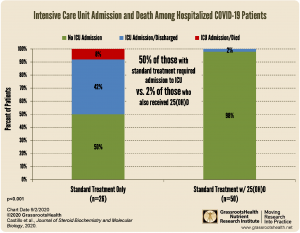 The first Randomized Controlled Trial on vitamin D and COVID-19 has shown a 96% lower risk of ICU admission for those receiving vitamin D (as 25(OH)D to quickly boost vitamin D blood levels) along with the standard treatment, compared to those receiving standard treatment alone.
The first Randomized Controlled Trial on vitamin D and COVID-19 has shown a 96% lower risk of ICU admission for those receiving vitamin D (as 25(OH)D to quickly boost vitamin D blood levels) along with the standard treatment, compared to those receiving standard treatment alone.
These results support many previous observational studies showing a relationship between vitamin D levels and intake and COVID-19 severity.
Review the Latest Nutrient Research for COVID-19
GrassrootsHealth Nutrient Research Institute has launched the new Immune Boost project with the use of our myData-myAnswers nutrient health system that nearly 15,000 people are already using for their health. Specific markers that influence immune health are suggested for testing as part of this project including:
- Vitamin D
- Omega-3 Index
- Essential elements magnesium, selenium, and zinc
- hsCRP
Our goal is to demonstrate how one can use the Nutrient Research Model established by Dr. Robert Heaney to show the effect of vitamin D serum levels of at least 40 ng/ml (100 nmol/L) on risk reduction for all ethnicities in the population. Status and intake of other nutrients will also be analyzed for any type of relationship to immune status and symptom severity. Join the project today!
Please let us know if you’re interested in helping sponsor this project.
Through GrassrootsHealth Nutrient Research Institute, you can also test your essential elements magnesium, copper, zinc and selenium, toxins such as lead, mercury and cadmium, as well as your omega-3 levels, inflammation levels and thyroid stimulating hormone (TSH) level. Find out your levels today! Log on to the test selection page (click the link below) to get your tests and see for yourself if your levels can be improved.
Make sure you track your results before and after, about every 6 months!
Click Here to Access the Test Page
How can I track my nutrient intake and levels over time?
To help you track your supplement use and nutrient levels, GrassrootsHealth has created the Personal Health Nutrient Decision System called
For each specific supplement, you can track what days you take it, how much, and many other details. This will help you know your true supplemental intake and what patterns of use work for you to reach and maintain optimum nutrient levels. Check it out today!


